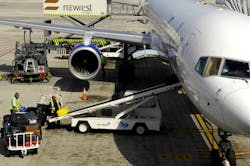EU Lawmakers Back Proposal On Revised Ground Handling Policy
The European Parliament (EP) has approved revisions to ground handling regulations at major EU airports to open up ground handling services to more competition.
As per the new proposal, all airports with a capacity of at least 15 million passengers and/or 200,000 tins of freight per year will have to deploy at least three ground service providers, up from the current two providers.
The vote to pass the proposal was originally due in December 2012, but was postponed in the midst of protest, and the new proposal has been adopted by 455 votes to 239, with 18 abstentions.
The revised policy, which comes after the partial liberalisation of airport services in 1996, has been intensely opposed by trade unions, with the fear that it will impact their salaries.
European Parliament has also specified that minimum service quality standards should be maintained at all European airports with a passenger handling capacity of more than 5 million per year.
European People's Party lawmaker Artur Zasada said: "This will include the maximum waiting time for baggage check-in, maximum time for delivery of first and last items of baggage, and holding minimum stocks of de-icing fluid."
There will also be a strict division of accounts for the airports offering their own handling services, while if the service providers are changed, member states have to ensure that the transfer of staff for airside services to the new service provider and collective agreements appreciated.
The new regulation could impact Germany, but in the UK and Scandinavian countries, the airport ground handling services market is already open.
According to the Airports Council International (ACI) Europe, the overall debate only centred on the opening of the market and social provisions.
ACI said that the European Parliament has ignored major, technical and routine operational issues that are involved in enhancing the passenger experience across the continent.
Additionally, ACI claimed that issues related to the workable implementation of minimum service quality levels for ground handling, airports' role as ground coordinators and the subcontracting requirements for airports have not been appropriately analysed and considered.
ACI warned that neglecting these issues in the second reading would crop up operational and legal problems such as including undesirable distortion of competition.
ACI EUROPE Director General Olivier Jankovec said that the goal of achieving better airports is something that is genuinely shared with the European Commission and that Europe's airports are committed to achieving.
"The second reading offers a fresh opportunity to look at the substance of how regulation can genuinely improve the passenger experience," Jankovec said.
"This should drive legislators not only in relation to ground handling, but also airport slot allocation - where decisive improvements are needed to ensure better use of capacity at congested airports."
Copyright 2013 Progressive Media Group LimitedAll Rights Reserved

